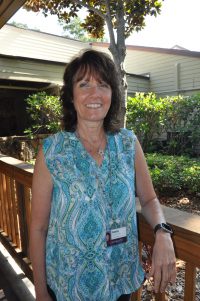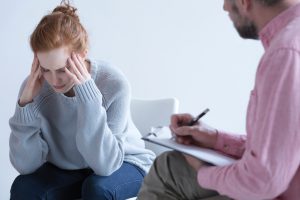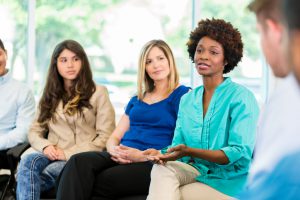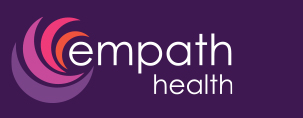
Empath Health Community Counselor Karla Swenson
When you go out into the world each day, you always expect to come back to the people you love. If a loved one suddenly dies or is killed one day, it will sideswipe you into shock and sorrow. Did you say, “Goodbye” or “I love you?” Why did this happen? How can you possibly face such a tragedy?
Counseling can be key for helping survivors find hope, share grief and grow forward into a new life.
In recognition of National PTSD (Post-Traumatic Stress Disorder) Awareness Month, meet Empath Health Community Counselor Karla Swenson, a licensed clinical social worker who specializes in sudden traumatic loss and grief. In this Q&A, she discusses symptoms and behaviors survivors often experience after these deaths, EMDR (Eye Movement Desensitization and Reprocessing) treatment and how she and her team provide counseling, support and healing for the future.
Q&A with Karla Swenson, MSW, RCSWI
What’s your background?
I worked as a social worker discharge planner at BayCare. I worked with patients, families, nurses, doctors and other staff in the hospital ICU (intensive care unit), CCU (critical care unit) and medical surgical floor.
Why did you decide to work for Empath Health?
I did my internship in community counseling here when I was in school for my master’s. That was my first experience doing grief counseling in more than the hospital short-term, emergency setting. After I did my internship, I just knew that this is what I wanted to do. I felt a sense of connection with the staff and clients and wanted to help those who had a sudden unexpected loss. I have been here for more than two years.
 What symptoms and behaviors might people experience after such a death?
What symptoms and behaviors might people experience after such a death?
A traumatic loss typically is sudden and unexpected. It could be a car accident, suicide, homicide or a sudden medical death. People’s sense of safety and security is kind of destroyed and taken away. They realize that something really bad can happen without any warning. It takes a tremendous toll. It affects all parts – emotional, physical and spiritual, including:
• Difficulty sleeping or eating
• Nightmares
• Flashbacks with a specific traumatic image or a last conversation
• Intrusive thoughts
• Anxiety
• Feeling loss of control, safety and security
• Exhaustion
• Stomach aches, nausea and pain
• Difficulty remembering or concentrating
• Hypervigilance with sounds
• High stress
• Irritability
• Change in self-esteem
• Lack of trust with the world and environment
• Fear
I worked with a girl whose stepmom was in the car and got shot and killed. She witnessed that. When it gets dark at night that would be a trigger for her. Once it starts getting dark she wants to be safe at home.
 When do people tend to start community counseling?
When do people tend to start community counseling?
Everyone is different. Some people come in right away after a couple of weeks. Most people tend to come in after one to two months. Sometimes people will take a break and then come back. Most people are told that they need to go right away, but they might not really be ready for it.
What services are offered?
We work with children ages five and older and adults. We do individual counseling, family counseling, camps and group counseling, if there’s a need.
Our bereavement camp is for kids who have lost someone. This includes a day of therapeutic and fun activities for them to be able to process their loss and to let them know that they are not the only ones dealing with this. We also do a family camp for adults, children, grandparents, aunts, uncles or other family members, depending on the type of loss. This includes a day of therapeutic and fun activities where the kids get time with other kids, the adults get adult time and there are activities with everyone together.
The camps have been incredible. It’s amazing to see that at the beginning of the day the kids and adults are nervous and at the end of the day they say they want to come back and do it again. It gives them hope. It can help them see that they are not alone and they will get through this. It’s very fulfilling to help be a part of their healing process.
What do you hope to achieve with clients?
Giving them hope. I hope to give them a place to share whatever it is they need to share to help them with their healing process. Most people don’t want to feel those feelings. We give them a safe, sacred space to explore and feel that raw emotion. We want them to have the tools to go out, function and live their life. They can learn how to integrate the loss into their life, not that they will ever forget it. They can still have a full and joyful life again.
You’re certified in EMDR. How does that treatment work?
EMDR was developed by Francine Shapiro and used a lot with people who experience traumatic events and PTSD, including combat veterans.
The treatment uses eye movements to help the brain reprocess the memory. It doesn’t erase the memory and it’s not hypnotism, it changes the effects of the memory. It allows the brain to heal.
How have students been affected by the Parkland school shooting and other tragic events?
It does bring up people’s emotional thoughts and fears. Parkland came up frequently in the sessions with teens and younger kids. There’s the fear if something like that can happen here. It’s about helping them understand how they can find safety and security in their world. Having a routine can help them feel that things are going the way they are supposed to go.
What have you learned from your work?
Self-care is so important. I like to be outside, walk, hike and spend time with friends. I love to bake, that’s very relaxing. I took cake-decorating classes. I like to do cupcakes and cookies.
My spiritual life is a support for me. Being with my coworkers is another huge part of taking care of myself. Sometimes we process cases, brainstorm or do fun things together. This has probably been the most supportive environment that I’ve worked at in a very long time.
One of the biggest things I’ve learned is to not take things for granted because I see how quickly things can change. It has helped me become more present and live in the now.
Has someone you love died unexpectedly?
We are here to support you. For counseling services, call us at (727) 523-3451 or go online to register for a support group.

I would like more info about the Bereavement camp for children please
Hi Michelle,
Please call (727) 523-3451 and someone from our Community Counseling Center can assist you. Thank you!
Hello~
We have suffered a traumatic loss of my husband and our eight year old daughter’s father to a sudden and unexpected heart attack at the young age of 48. I would like information about as many things I can get involved in for us to learn to live with this and go forward with hope. I’m interested in the kids camp, family nights, family camps, anything and everything. Please email me at BarefootAndria@gmail.com or give me a call at 727-373-9137.
Thank you so much for your help. We are in desperate need.
Thank you,
Andria Stark
Hi Andria,
We have sent your request to our Community Counseling program. A member of the team will contact you shortly.
Thank you!